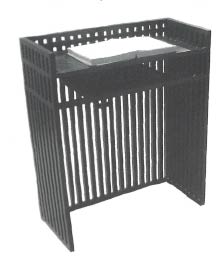Updated March, 2025
It seems to me no accident that the recovery of interest in biblical preaching has coincided with an increase in the frequency of Holy Communion. In his 1962 book Pulpit and Table, Howard Hageman, a pastor and scholar from the Reformed Church in America, said, “A church that loses the Word must finally lose the sacrament. But is it not equally true that a church which loses the sacrament must finally lose the Word?”
This statement suggests that Word and sacrament are interdependent within the environment of the church; thus, we may speak of an “ecology of Word and sacrament.”
Before the Reformation: Loss of Both Word and Sacrament
The 16th-century reformers confronted a church that had lost the Word. That loss had also caused it to lose the sacrament. Preaching had become rare in the average parish church on the eve of the Reformation. Most Christians would seldom, if ever, have heard a compelling, biblically-based sermon. As preaching had faded over the centuries, the Lord’s Supper had lost its character. It no longer resembled a meal as much as a sacrifice. The priest at his altar was often hidden behind a screen. The prayers and readings were in an unknown tongue. The role of the layperson was simply to be present, listening for the sanctuary bell that signaled that the act of consecration had taken place.
Most churches had not only a main altar but several side altars as well. In many places where there was more than one priest, Mass was said several times a day as well as on Sundays, with each priest offering the eucharistic sacrifice for the intentions of particular persons. But even though there may have been multiple Masses in the same church, few people actually communed. Communion was only for those who had adequately prepared and presented themselves in a state of grace. Most simply stood by until the Mass was over.
In 1215, the Fourth Lateran Council ruled that the faithful must commune at least once a year, at Easter. When they did commune, they were not offered the cup, out of fear that they might spill some of the wine and be guilty of a sacrilege. In spite of the fact that many Masses were said every day, the church had lost the experience of the sacramental meal. The church that lost the Word lost the sacrament.
Recovering the Word, Marginalizing the Sacrament
Like nearly every movement of church renewal, the Protestant Reformation addressed the question of worship. The problems of the medieval church were multiple, and each problem led to another. Doctrinal distortions and ethical lapses and the degeneration of the church’s worship life were all tangled up, each feeding the other. The reformers had to address all these issues at once. But if it is true that the way a people pray will shape the way they believe, and contribute as well to the shaping of their character, then reforms in worship are likely to have the most immediate impact upon the faithful.
John Calvin had considerable acquaintance with the great theologians of earlier generations and with the history of the development of Christian worship. He understood that the public reading and preaching of Scripture had played an important role in the church in the centuries preceding the medieval period. We all know how deeply he committed himself to a recovery of biblical preaching. In fact, many identify biblical preaching as the hallmark of the Reformed church.
It is a popular misconception, however, that Calvin had little use for the sacraments. In fact, Calvin had no less respect for the Eucharist than did the Catholics. His strategy for church renewal included both the recovery of biblical preaching and restoring the ancient norm of Word and sacrament in every Lord’s Day service. Each one—Word and sacrament—would contribute to the integrity of the other. Part of Calvin’s strategy for the renewal of the church’s sacramental life was to recover the Lord’s Supper as communal meal, received by nearly all present—not only by a pious handful.

Calvin’s intention was subverted, however, when the secular authorities overruled him. When the normal experience of the vast majority of Christians had been to commune once or twice a year, it seemed to the authorities an enormous leap that they should commune as often as fifty-two times a year.
The practice at Geneva became to celebrate the Lord’s Supper four times a year. Although most Christians then actually communed four times more often than they had before Calvin’s reforming work in Geneva, Calvin nevertheless regarded this practice as defective. His lifelong hope was that this defect would, in time, be corrected. Instead, the defective practice became the norm in Reformed churches, sanctified by long usage despite the fact that it was rooted in local circumstances rather than in theological or liturgical principle.
The church that had recovered the Word gradually pushed the sacrament toward the margins. This marginalization of the Lord’s Supper, I believe, affected the preaching of the Word. Where Word and sacrament are held together, each serves the integrity of the other. When the feast spread by God at the Lord’s table is spurned, the preaching of the Word also starves.
The Lord’s Supper clearly represents something given. Bread is taken, blessed, broken, and given. The cup is taken, blessed, poured, and given. What is given? The gift offered in the Lord’s Supper is none other than Jesus Christ. What is given in the reading and preaching of the Word? The answer is the same: Jesus Christ. Preaching, while not a sacrament of the church, is nevertheless sacramental, presenting Christ to the people.
But when the Lord’s Supper is limited, something happens to preaching. Not only the congregation, but also the preacher, is prone to develop misconceptions of what preaching is meant to be. We are familiar with the many uses of public speech. That very familiarity makes it easy to understand preaching as though it were some other sort of public address: information, motivation, inspiration, propaganda, confrontation, therapy. But while Christ in the midst of his people may teach, console, heal, confront, or simply be present, the preaching of the Word must not be reduced to any category of public speech.

Apart from the Lord’s Supper, it is far too easy to lose track of the sacramental quality of the service of the Word. It is too easy to forget that the Word is first of all a vehicle by which the risen Lord draws near to the people of God. It is far too easy to forget that the Word is bread of life and cup of salvation. Preaching is far more than book review, religious study session, editorial comment on the events of the day, advocacy for some institution or cause, or group therapy. I remember receiving material from an interfaith group urging my congregation to celebrate “Traffic Safety Sabbath.” Many of us who preach feel compelled to prove that our preaching is useful by linking it to some other kind of public speech. But the usefulness of the service of the Word lies precisely in that it does not pretend to be useful in ordinary ways. Like the holy table, it sets before us a pure gift—nourishment for the soul. And Jesus Christ is the heavenly food.
Learning Again to Cherish Both Word and Sacrament

It is not too surprising, then, that in the last thirty years, churches that turned toward more frequent communion also turned toward biblical preaching and away from topical models, and vice versa. It is no accident that when we lose the sense of the sacramental in either table or pulpit, we are likely to become disoriented as to what our worship is all about. That disorientation fuels battles over music and style that cannot and will not lead to a renewal of worship, no matter who “wins.” The church that loses the Word loses the sacrament. The church that loses the sacrament surely also loses the Word.
In a time when many congregations are eager to revisit questions about worship, there is a better move than just trying to figure out “how” to do it. That better move is to examine more deeply the ecology of Word and sacrament. Both are gifts rooted in the ministry of Jesus and cherished by the early church. Both are gifts of God to the people of God. Both are at their best when each accompanies the other.
